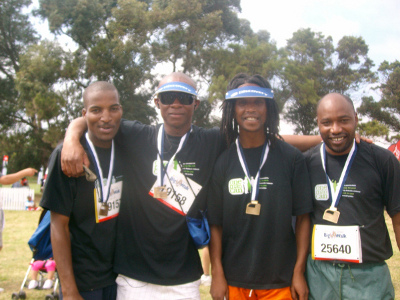In September this year, Sonke launched its first Community Action Team (CAT) consisting of ex-inmates – One Man Can Beyond the Bars. So far, five sessions have been held at the Gugulethu Wellness clinic, with around ten participants at each.
Why an ex-inmate community action team?
Earlier this year, Sonke identified a gap in its prisons and community mobilisation programming. Namely, that our training with inmates in correctional centres did not link to our community work. After running our prisons transformation project in correctional centres since 2007, some of our inmate peer educators are now being released on parole.
To support ex-inmates to practice One Man Can as part of their reintegration into communities, and to contribute to reducing reoffending, Sonke created a pilot 6-month long group that meets twice a month. After completion of this pilot, the goal is for the participants to be an integral part of our advocacy to improve inmate and ex-inmate access to their rights.
Orientation and Introduction
The participants, Sonke facilitator, Mzamo Sidelo, with support from a former inmate peer educator, and now prisons team member at Sonke, Welcome Witbooi, discuss the function and their expectations of the group, which is established as a safe space where participants can be open. It is a non-judgmental space where the participants can talk about health and crucial issues in their lives. The sessions follow the modules in Sonke’s One Man Can manual, examining issues of human rights, gender, and health. For ex-inmates, reintegration comes with a host of challenges including finding and keeping employment; resisting the pressures to re-commit crimes, for a variety of reasons; maintaining family relationships after time away from the home; and overcoming the stigma of being an ex-offender and potentially meeting discrimination and judgment from their community members.
Addressing Change
In thoughtful discussions over the weeks, participants shared how they view the importance of change, and why change should be regarded as crucial for people attending the OMC programme. While Sonke’s training programmes like this one are aimed at behaviour change, we also remember that change for the sake of change is not enough. Equitable values and attitudes that underpin behaviour change are the ultimate goal – that people who go through our training processes change not because they are afraid of the law, or because One Man Can tells them to, but because they come to a personal point of understanding and accepting that equality truly is better for everyone. Change is ultimately a personal decision, and no amount of programmes attended can guarantee change unless the person attending has made the choice.
Participants have discussed the difficulties of being an unemployed man, and how this has required that some of them perform the domestic tasks in their families. This has been a challenge for some of them, having to grapple with the social norms about what their communities view as ‘women’s work’, and coming to terms with men and women’s equality and sharing responsibilities in the home.

Other topics that have come up include resisting pressure from friends to get involved in activities that would create trouble – crime, drugs and gangs; leaving the Number, an intertwined cluster of gangs operating both in and out of prisons; confronting fear and building courage; masculinities and their influence on behaviour; and the importance of self-reflection. The group is keen to build on their relationships and is planning for activities that take them out into the community more, and build their team spirit, including hikes and other social activities.
Another goal of this CAT is for participants to be at the forefront of advocacy to promote inmate and ex-inmate rights. This is because prisons advocacy in South Africa is largely missing their voices, and it is critical for ex-inmates to shape and drive the advocacy that affects them. Sonke’s goal is to foreground the ex-inmate CAT members’ voices and ensure their participation in prisons advocacy in the community, in media, and by speaking directly to policy makers in Parliament.
This is one of Sonke’s most exciting projects at the moment, and we wish all participants and the facilitators the best in their journey together beyond the bars.

